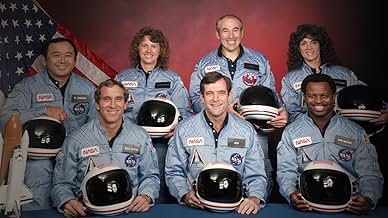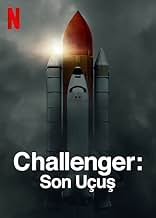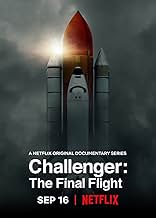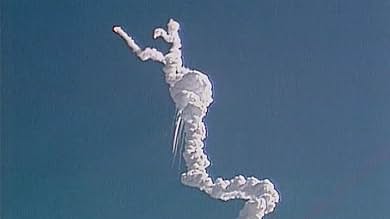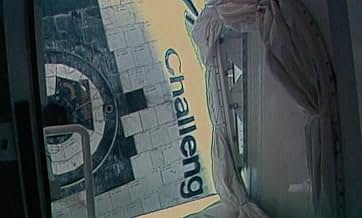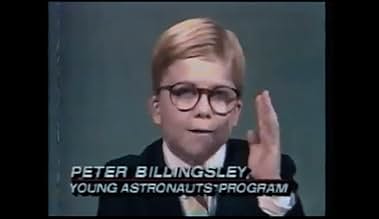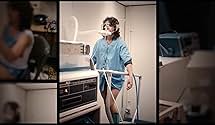IMDb-BEWERTUNG
7,8/10
8282
IHRE BEWERTUNG
Füge eine Handlung in deiner Sprache hinzuFour-part docuseries on the 1986 Challenger space shuttle disaster, unpacking an indelible moment for a generation of Americans.Four-part docuseries on the 1986 Challenger space shuttle disaster, unpacking an indelible moment for a generation of Americans.Four-part docuseries on the 1986 Challenger space shuttle disaster, unpacking an indelible moment for a generation of Americans.
- Stoffentwicklung
- Hauptbesetzung
- Auszeichnungen
- 2 Nominierungen insgesamt
Folgen durchsuchen
Empfohlene Bewertungen
Full disclosure: I am a space enthusiast. I would have loved to go to space. And I vehemently support the US manned space program.
However... I have lived through all three major US space catastrophes, where we managed to kill (as of today) 17 astronauts in spacecraft (albeit three of those on the ground), and the sad truth about each of those tragedies is that they occurred because of people who put "schedules" and/or "money", ahead of crew safety. My "impression" is that, at the moment, we seem as though we might be over that hurdle (in our space program), but if for no other reason, this four-part documentary should serve as a cautionary tale, as it clearly shows how seemingly intelligent people, can make extremely dumb (or selfish) decisions, with total disregard for human life. It also clearly shows how, when incidents like these occur, you absolutely need to bring in a bevy of _independent_ outsiders to oversee the inevitable investigations that follow, because the guilty parties (be they individuals, or corporations) will go out of their way to try to gloss over their culpability, in having caused failures on this scale.
The focus of this documentary is different than a lot a previous efforts that cover this tragedy. It does go into a lot of detail about the root cause of the accident, how it was already a known (and very concerning) problem, and how/why managers within the contractor (Morton Thiokol) and NASA ranks choose to rationalize away the risks, simply to try to keep the shuttle program "on schedule". But this documentary spends just as much time talking about the seven people who lost their lives, and numerous family members and friends of the astronauts participated in new interviews, to give a more thorough understanding of who these people were, and what their lives were before the tragedy, and could have been, had their lives not ended so unnecessarily.
Also, there are interviews with people who risked the livelihoods to come forward during the Rogers Commission investigation, to provide information that no one else was providing, which clearly detailed the root cause of the accident, and the culpability of the people who decided to ignore the warnings of "impending doom". And, as with the family members, there are also new interviews (somewhat surprisingly) with the key (living) Thiokol and NASA employees who participated in the (flawed) recommendation to launch Challenger, even though their own engineers were vehemently opposed to doing so.
Anyway, this is an important slice of US Space Program history, and the series gives a solid understanding of how/why this tragedy occurred, as well as an "up close and personal" look at the people involved. I highly recommend it.
However... I have lived through all three major US space catastrophes, where we managed to kill (as of today) 17 astronauts in spacecraft (albeit three of those on the ground), and the sad truth about each of those tragedies is that they occurred because of people who put "schedules" and/or "money", ahead of crew safety. My "impression" is that, at the moment, we seem as though we might be over that hurdle (in our space program), but if for no other reason, this four-part documentary should serve as a cautionary tale, as it clearly shows how seemingly intelligent people, can make extremely dumb (or selfish) decisions, with total disregard for human life. It also clearly shows how, when incidents like these occur, you absolutely need to bring in a bevy of _independent_ outsiders to oversee the inevitable investigations that follow, because the guilty parties (be they individuals, or corporations) will go out of their way to try to gloss over their culpability, in having caused failures on this scale.
The focus of this documentary is different than a lot a previous efforts that cover this tragedy. It does go into a lot of detail about the root cause of the accident, how it was already a known (and very concerning) problem, and how/why managers within the contractor (Morton Thiokol) and NASA ranks choose to rationalize away the risks, simply to try to keep the shuttle program "on schedule". But this documentary spends just as much time talking about the seven people who lost their lives, and numerous family members and friends of the astronauts participated in new interviews, to give a more thorough understanding of who these people were, and what their lives were before the tragedy, and could have been, had their lives not ended so unnecessarily.
Also, there are interviews with people who risked the livelihoods to come forward during the Rogers Commission investigation, to provide information that no one else was providing, which clearly detailed the root cause of the accident, and the culpability of the people who decided to ignore the warnings of "impending doom". And, as with the family members, there are also new interviews (somewhat surprisingly) with the key (living) Thiokol and NASA employees who participated in the (flawed) recommendation to launch Challenger, even though their own engineers were vehemently opposed to doing so.
Anyway, this is an important slice of US Space Program history, and the series gives a solid understanding of how/why this tragedy occurred, as well as an "up close and personal" look at the people involved. I highly recommend it.
I rarely cry over any television program or film, but this one did me in. I was 13 years old when the Challenger tragedy occurred, and my school had each class watch it live on TV. I will never forget the feeling of watching this happen real time, when my classmates and I were so thrilled and excited about an everyday school teacher going into space. It gave us all hope that we could do anything we wanted to do if we wanted it badly enough. Then, the unthinkable happened. They actually canceled school the next day to allow our young minds and hearts to come to terms with what we saw.
Like the tragedy of the Titanic, this is a bold reminder that mankind is NOT infallible and is inherently fragile. We may *advance* beyond our wildest dreams, but whenever human involvement is part of the equation, the worst can happen.
My heart goes out to the families and friends of these seven brave crewmembers and all of the others who have perished in other disasters. I had forgotten that they were able to retrieve the bodies of the Challenger crew. Hopefully that provided some sense of peace for those who continue to mourn their loss
RIP: Michael J. Smith Francis R. (Dick) Scobee Ronald E. McNair Ellison S. Onizuka Sharon Christa McAuliffe Gregory Jarvis Judith A. Resnik
You are true American HEROES and I will never forget you and your sacrifice.
Like the tragedy of the Titanic, this is a bold reminder that mankind is NOT infallible and is inherently fragile. We may *advance* beyond our wildest dreams, but whenever human involvement is part of the equation, the worst can happen.
My heart goes out to the families and friends of these seven brave crewmembers and all of the others who have perished in other disasters. I had forgotten that they were able to retrieve the bodies of the Challenger crew. Hopefully that provided some sense of peace for those who continue to mourn their loss
RIP: Michael J. Smith Francis R. (Dick) Scobee Ronald E. McNair Ellison S. Onizuka Sharon Christa McAuliffe Gregory Jarvis Judith A. Resnik
You are true American HEROES and I will never forget you and your sacrifice.
I've seen every documentary on space and the Challenger that have been produced. Many were bad, some were good. This four part series is pretty good, covering familiar ground and likely a good refresher for anyone who lived through those times, or more beneficially for those younger people who are just raising their awareness and understanding of this troubling catastrophe.
The producers did use the "it's going to blow up" scenario as the dramatic leverage (e.g. cliffhanger) here. I think its overuse is justifiable, though, given the fact that if the NASA decision makers had listened to the whistleblowers and weighed the risks, the crew would have been pulled off Challenger until corrective design changes could be made (or at the very least, until a launch attempt in February when temperatures were above freezing could be attained).
One remarkable thing to note: Americans were proud of our accomplishments then, and the early footage of the shuttle launches proves it with various video segments showing people actually waving flags and saying how proud they were of their country. It is sad to think that that very footage seems so alien now, given how bad many citizens of America love to trash their own country.
The producers did use the "it's going to blow up" scenario as the dramatic leverage (e.g. cliffhanger) here. I think its overuse is justifiable, though, given the fact that if the NASA decision makers had listened to the whistleblowers and weighed the risks, the crew would have been pulled off Challenger until corrective design changes could be made (or at the very least, until a launch attempt in February when temperatures were above freezing could be attained).
One remarkable thing to note: Americans were proud of our accomplishments then, and the early footage of the shuttle launches proves it with various video segments showing people actually waving flags and saying how proud they were of their country. It is sad to think that that very footage seems so alien now, given how bad many citizens of America love to trash their own country.
Much like President Kennedy's assassination on 11/22/63 or the terrorist events of 9/11/01, the moment that the space shuttle Challenger exploded just minutes after take-off in 1986 is one of those "where were you when..." moments. This documentary looks back at the tragedy and its context in American culture at the time.
The first two episodes are more history lessons than anything else, setting the groundwork for why the space shuttle program--and Challenger specifically--was a topic of conversation throughout the 1980s. It also examines all the crew members of that fateful voyage, including of course the much-publicized schoolteacher Christa McAuliffe. Your enjoyment mileage may vary for these episodes, as besides interviews with surviving family members they don't bring much more to the table other than context.
The final two episodes, however, really dig into the exact reason behind the malfunction (faulty o-rings) and clearly re-trace a faulty decision-making process from NASA that placed slavish devotion to schedule (and some hubris mixed in) over protecting human life. These episodes are riveting, especially when key NASA players are interviewed for their thoughts after the passage of time. You might be surprised at the recalcitrance of some of them.
Overall, this is a solid and balanced (both context and deep-dive) look at an incredibly sad event. It will bring tears to your eyes on multiple occasions. The access to family members of the astronauts, former high-level NASA officials, and even certain celebrities of the time are the hallmark here, along with a solemn lesson to be learned about the value of safety versus hubris.
The first two episodes are more history lessons than anything else, setting the groundwork for why the space shuttle program--and Challenger specifically--was a topic of conversation throughout the 1980s. It also examines all the crew members of that fateful voyage, including of course the much-publicized schoolteacher Christa McAuliffe. Your enjoyment mileage may vary for these episodes, as besides interviews with surviving family members they don't bring much more to the table other than context.
The final two episodes, however, really dig into the exact reason behind the malfunction (faulty o-rings) and clearly re-trace a faulty decision-making process from NASA that placed slavish devotion to schedule (and some hubris mixed in) over protecting human life. These episodes are riveting, especially when key NASA players are interviewed for their thoughts after the passage of time. You might be surprised at the recalcitrance of some of them.
Overall, this is a solid and balanced (both context and deep-dive) look at an incredibly sad event. It will bring tears to your eyes on multiple occasions. The access to family members of the astronauts, former high-level NASA officials, and even certain celebrities of the time are the hallmark here, along with a solemn lesson to be learned about the value of safety versus hubris.
I found it interesting that the name "Roger Boisjoly" wasn't mentioned once. The man who probably fought harder than anyone to fix the o-ring problem gets passed by?
While the series held my interest for all four episodes, a little more tech and a little less teacher would have been better, for me at least.
WUSSTEST DU SCHON:
- WissenswertesWhile the Challenger crew were the first to die during a mission, they were not the first NASA crew to be killed. The three-man crew of Apollo 204 (aka, Apollo 1), Gus Grissom, Roger B. Chaffee and Edward H. White II were killed in a fire in their capsule during a launch practice run on the launch pad on January 27, 1967. The docuseries makes no mention of this earlier fatality (what the NASA engineer said was that no NASA astronaut had been "killed on their way to space" to fit the narrative of the Challenger deaths, so it was a matter of semantics).
Top-Auswahl
Melde dich zum Bewerten an und greife auf die Watchlist für personalisierte Empfehlungen zu.
- How many seasons does Challenger: The Final Flight have?Powered by Alexa
Details
- Erscheinungsdatum
- Herkunftsland
- Offizieller Standort
- Sprache
- Auch bekannt als
- Challenger: The Final Flight
- Produktionsfirmen
- Weitere beteiligte Unternehmen bei IMDbPro anzeigen
- Laufzeit45 Minuten
- Farbe
- Sound-Mix
Zu dieser Seite beitragen
Bearbeitung vorschlagen oder fehlenden Inhalt hinzufügen

Oberste Lücke
By what name was Der letzte Flug der Challenger (2020) officially released in India in English?
Antwort


